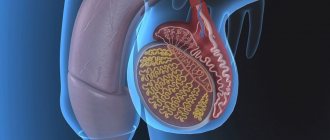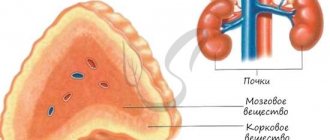How do the adrenal glands affect blood pressure?
Aldosterone
The main target of this hormone is the kidneys.
It promotes the release of Potassium ions, and maintains the content of Sodium and Chlorine. Thanks to the action of aldosterone, the ability of cells and tissues to retain water increases. This maintains water-mineral balance in the body. The result of the action of aldosterone is an increase in blood volume in the vascular bed and an increase in blood pressure. Normally, this mechanism is activated during blood loss and hypotension.
Cortisol
It is often called the stress hormone, and this is partly true. This substance circulates in our body constantly, and its concentration is higher in the morning than in the evening.
It regulates blood sugar and its conversion in the liver, the immune system, and also affects blood pressure and the functioning of cardiovascular organs in this way:
- Increases the sensitivity of blood vessels to adrenaline;
- Reduces capillary permeability;
- Maintains arterioles in tone;
- Increases myocardial contractile function;
Adrenalin
Adrenaline affects the body in several ways:
- Increased cardiac output and blood pressure when beta-adrenergic receptors of the heart are stimulated;
- Constriction of peripheral vessels;
- Activation of receptors of the glomerular apparatus of the kidneys, activating the hormonal system (renin-angiotensin-aldosterone), responsible for increasing blood pressure.
Cushing's syndrome and disease.
An adrenal tumor or enlarged adrenal glands can secrete another type of hormone - cortisol. If too much of this hormone is produced, a condition called hypercortisolism develops. There are two possible variants of hypercortisolism:
* If the adrenal glands work autonomously, releasing cortisol into the blood regardless of the body's needs and regulation by the pituitary gland, then this disease is called Cushing's syndrome.
* If the adrenal glands are hyperfunctioning due to the fact that they are stimulated by a pituitary tumor, then Cushing's disease is diagnosed.
Outwardly, both of these diseases manifest themselves in the same way; they can only be distinguished through a series of laboratory tests.
Hypercortisolism is characterized by:
- increased blood pressure,
- slimming limbs,
- fat deposits in the abdomen, upper back, shoulders,
- muscle weakness,
- the face becomes round and red,
- the appearance of red-violet stretch marks (striae) on the skin of the abdomen, thighs, shoulders,
- formation of bruises, minor hemorrhages on the skin from minimal impacts,
- bone fractures due to minor trauma due to the development of osteoporosis,
- infrequent or absent menstruation,
- infertility,
- tests may reveal an increase in cholesterol, an increase in blood sugar, up to the development of diabetes mellitus.
What diseases of the endocrine system cause blood pressure changes and how?
| Disease | Symptoms and signs | Diagnostics | Differential diagnosis |
| Pheochromocytoma is a benign tumor of the adrenal medulla that produces large amounts of adrenaline. |
The disease manifests itself in attacks. A sudden increase in blood pressure occurs when:
Less commonly, hypertension can have a permanent course. |
|
|
| Cushing's syndrome and disease are a consequence of tumors of the adrenal gland and pituitary gland, respectively. Characterized by excess production of cortisol. |
|
|
|
| Hyperaldosteronism (Conn syndrome) - occurs with hyperplasia (increase in volume) of adrenal tissue, or tumor growth in this area. |
|
|
|
| Addison's disease (adrenal insufficiency) is a hormonal deficiency that occurs with hypoplasia of the glands, weak stimulation by the pituitary gland, as well as with the destruction of their tissue due to tuberculosis, hemorrhages, and autoimmune processes. |
|
|
|
How to identify the cause of high blood pressure? What kind of examination is needed?
If a doctor suspects an endocrine disease as a possible cause of high blood pressure, he will refer the patient for the following studies:
- Ultrasound of the adrenal glands.
- If an adrenal tumor is detected by ultrasound, a CT (computed tomography) scan of the adrenal glands with contrast is necessary.
- If Cushing's disease is suspected, the patient may be referred for an MRI of the pituitary gland with contrast.
- In all patients with high blood pressure, blood sugar on an empty stomach and after meals, glycated hemoglobin, lipid profile, and blood clotting parameters must be examined.
- Hormonal studies:
- metanephrine, normetanephrine in blood or 24-hour urine - these tests are elevated in pheochromocytoma
- aldosterone and blood renin (or plasma renin activity), aldosterone-renin ratio - with aldosterone and idiopathic hyperaldosteronism, blood aldosterone is increased, and renin is significantly reduced, the aldosterone-renin ratio is increased. Proper blood sampling is very important - after 30 minutes in a lying position. It is necessary to discontinue diuretics, especially veroshpiron, 3 weeks before the test.
- daily urinary excretion of cortisol is increased in hypercortisolism.
- cortisol of saliva collected at 23.00 is increased with hypercortisolism.
- overnight test with 1 mg dexamethasone.
- blood test for ACTH at 9.00, 21.00, blood test for cortisol at 9.00, 21.00.
If abnormalities are detected in these tests, further in-depth examination in the hospital is necessary.
How to treat such changes in blood pressure?
It is useless to treat blood pressure due to endocrine pathology until the provoking factor – the underlying disease – is removed. Symptomatic therapy is possible, but it will not give the same effect as surgical treatment.
| Disease | Drug treatment | Surgery |
| Pheochromocytoma | Prescribed for preparation for surgery and in inoperable cases for palliative therapy. Beta and, less commonly, alpha blockers are used. | Laparoscopic tumor removal is the gold standard of treatment |
| Cushing's syndrome and disease | Symptomatic treatment of concomitant diseases. | The optimal treatment for the syndrome is removal of the adrenal tumor, and in case of illness, the pituitary tumor. |
| Hyperaldosteronism (Cohn syndrome) | For inoperable forms, the diuretic Spironolactone is used. This remedy is contraindicated for men as it causes impotence and gynecomastia. Eplerenone is prescribed for them. Calcium channel blockers (Nifedepine) are actively used. Symptomatic therapy is acceptable. A low-salt diet is mandatory. | Removing the tumor is the best choice. |
| Addison's disease (adrenal insufficiency) |
| No surgical treatment is provided |
Aldosteroma
Aldosteroma is also a tumor of the adrenal gland, but it secretes another hormone in excess - aldosterone. Aldosteroma is a benign tumor of small size, about 2 cm.
Excess aldosterone in the body causes fluid retention, loss of potassium in the urine, decreased potassium levels in the blood, and affects the walls of blood vessels. Blood pressure with aldosterome is constantly elevated and is difficult to treat with conventional antihypertensive drugs. Very characteristic of this tumor (although not in all patients) is a decrease in the level of potassium in the blood, which is dangerous for the development of arrhythmias. Despite fluid retention in the body, there is usually no edema with aldosterome.
In addition to a unilateral adrenal tumor, there is a condition such as hyperplasia (enlargement) of one or both adrenal glands. If the enlarged adrenal glands produce too much aldosterone, the disease is called idiopathic hyperaldosteronism . It manifests itself in the same way as aldosteroma.
How should the patient be monitored after treatment?
Patients diagnosed with arterial hypertension of endocrine origin require the participation of several specialists in their treatment. Often, this is a family doctor, internist or cardiologist, as well as an endocrinologist who will examine the adrenal glands for hypertension.
In addition, it is necessary to keep a diary where the manifestations of the disease, the level of pressure, pulse, fluids drunk, diuresis, medications taken and important notes that can help the doctor in correcting treatment will be recorded.
Women occupy a special place, since in most cases the question of pregnancy arises at some point. Nowadays, not a single self-respecting specialist will tell a patient that she is forbidden to become pregnant without convening a medical consultation. With timely surgical treatment and medication support, as well as under the supervision of a cardiologist and endocrinologist, family planning should not be hindered by anything.
At the same time, if a woman does not plan to have children, or the condition of her body does not allow this, reliable contraception is necessary.
What tests should I take?
Testing blood for hormones in laboratories is relatively expensive, so taking them yourself can be quite an expensive undertaking. The procedure can mislead both you and the doctor if the rules for preparing for blood sampling were violated.
During the diagnostic process, the doctor prescribes only the tests necessary at the moment, moving from simple to complex. He will also always tell you how best to take each of them in order to get the most reliable result.
Increased blood pressure when talking
Oksana
174 views
June 11, 2021
Good afternoon From December to February (after mild Covid) I was very nervous and stressed. And at the beginning of February, vegetative crises began - the pressure jumped to 150/160 to 95/100. I was shaking inside my body, scared. But the pressure quickly dropped on its own. when I tried to somehow calm down. I lost my appetite, I lost weight because I ate almost nothing out of fear and pressure surges and constant internal trembling/vibration. When I arrived or just stood up and while standing, my heart beat strongly and my heart rate increased. It was difficult to walk, it seemed that it was hard for my heart to hang in its place, and I instinctively supported it by squeezing my abdominal muscles. . I went to a cardiologist and they put me on Holter and SMA for a day. They said that, in principle, everything is more or less normal, and this is all nervous, she told me to drink Capoten if the temperature rises and sent me to a neurologist. The average daily blood pressure was 129/86, the daily average -132/90 and the nightly average 115/71. It’s worth saying that after 2014 I had such crises once a year, but I took paroxetine (an antidepressant) for 3 months and forgot about everything. So the neurologist checked me, prescribed adaptol (which had zero effect) and sent me to a psychotherapist - she said that this was an anxiety disorder (she knew about this since 2014), I told her that paroxetine usually helped me - she prescribed, but when I started drinking it, a terrible thing began - for two weeks my anxiety did not go away every day at all - my blood pressure rose to 150/100 and stayed for a long time (although before that it dropped quickly on its own), I had to drink this capoten three times a day, it did not help . Knowing that there are side effects from paroxetine in the first weeks (although I had never experienced this before) - I tolerated this only on half a tablet. And then one day I felt so bad all day that I eventually had to go to the clinic - where they knocked it down for me for an hour with magnesium, the fourth capoten tablet of the day and some kind of calming agent, and in the end, after 15 minutes it was again 145/95. . After that, the psychiatrist stopped paroxetine and within a week I felt better, but my blood pressure still jumped up from time to time. but rarely. when at home. If I go out into the street and walk some distance, for example 1-2 km, I come and measure -160/100, my pee is a little bit, it gradually drops to my normal numbers -110/117 to 70/80. And another thing that worries me very much is that when talking, it rises high from 140/90 to 168/95. When I become silent, it goes down. The other day I had Holter and SMA done again, the cardiologist said that everything was fine with Holter, but the pressure was the same last time the values were approximately the same, although this time I hardly slept at all and was very worried, it seems to me that during these days the pressure was constantly slightly elevated. I had ultrasounds of the heart done 4 times in two months - everything was fine. Ultrasound of the thyroid gland and tests - normal.. the cardiologist prescribed Panangin, Omacor and lorist 12.5 mg and told me to drink physical therapy if it was elevated. And referred me to a psychotherapist. She said that it was all emotional - as such hypert. There is no illness. At the moment, the QUESTION is why and why does my blood pressure rise so high when walking and talking? and what should I do? Is this related to the nervous system? I’m already in despair, because essentially I can’t walk or talk. I feel good just lying down and silently
The question is closed
pressure
I was very nervous
weeks of anxiety
conclusions
The adrenal glands and high blood pressure caused by their dysfunction is a complex but solvable medical problem. The symptoms of endocrine hypertension themselves are nonspecific. Often, if detected early, surgery can reduce the signs of hypertension. Adrenal insufficiency is more difficult in terms of treatment and maintaining the patient’s quality of life, however, this problem can be resolved with the help of modern endocrinological drugs in optimal dosages.
Influence of the adrenal glands
As a rule, hypertension, which cannot be treated with conventional means, is a consequence of disorders of the endocrine system, including the adrenal glands. Therefore, antihypertensive drugs do not provide relief. Improper functioning of the gland leads to obesity, stretch marks on the body, general weakness and poor health, as a result of persistent and high blood pressure.
With adrenal disease, blood pressure can not only increase, but also be quite low. This is associated with adrenal insufficiency during the development of Addison's disease. When the disease becomes chronic, both paired organs are affected, in which case the production of the hormones cortisol and aldosterone becomes insufficient or stops completely.
The pressure in such patients drops sharply, dizziness is noted, pain appears in the digestive tract, in the joints and muscles, the skin and mucous membranes become yellowish. Dehydration of the body occurs due to large urine output, irritability or depression appears, the functioning of the reproductive system is disrupted, appetite decreases and, as a result, body weight.
This disease can be triggered by secondary hypoplasia, tuberculosis, neoplasms and metastases, injuries, stressful situations and other reasons.








